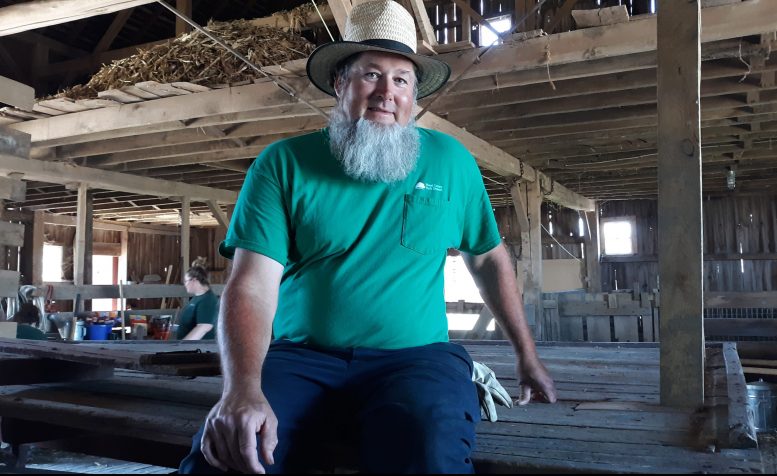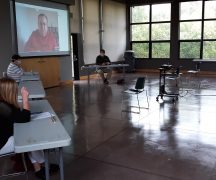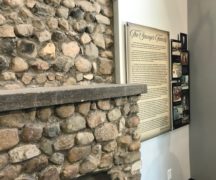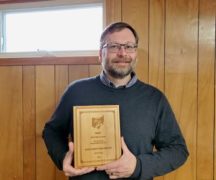By JAN LARSON McLAUGHLIN
BG Independent News
In his straw hat and long beard, Chris Dauer looks the part as he plants potatoes at Carter Historic Farm.
But for Dauer, his farming position is far more than role playing.
“I have a deep appreciation for old cars, old furniture and old people,” he said as he sat on an old wooden wagon in one of the old barns at the Wood County Park District’s historic farm north of Bowling Green.
But most of all he loves farming the way it used to be. So when the position of historic agricultural specialist opened last year at the Carter farm, Dauer jumped at the chance to combine his love of history, farming – and talking.
“We really are 100% true to depression era farming,” Dauer said, as he listed off the old equipment all dating prior to the 1940s that he has revived after they were put out to pasture.
“This is a working farm,” from the corn shredder to the manure spreader, he said. “We’re living history. It ain’t a slide show. You’re gonna see it, hear it and smell it.”
Dauer knows where to get his hands on old pieces to repair antique farm equipment. And if he can’t find them himself, he knows the people who can, said Corinne Gordon, historic farm specialist at the Carter farm.
“He is the right guy for the job,” Gordon said.
“I love educating the public and the young people,” he said.
Though his beard may look Amish, Dauer grew up on a farm in Wood County. “We’ve been here since the 1870s,” he said.
He does have close friends in the Amish community.
“I’ve worked in the fields with horses, and have gone to a barn raising.”
Dauer has always appreciated the old ways of farming.
“I just was thirsty for knowledge as a boy,” he said. While other children his age were quickly bored with stories from old farmers, Dauer was fascinated by them.
“They showed me how to shock wheat and do steam threshing,” he said. “I learned it from them first hand.”
“Most of my life, the knowledge I knew was useless to most people,” Dauer said with a grin. “Now I am putting it to use.”
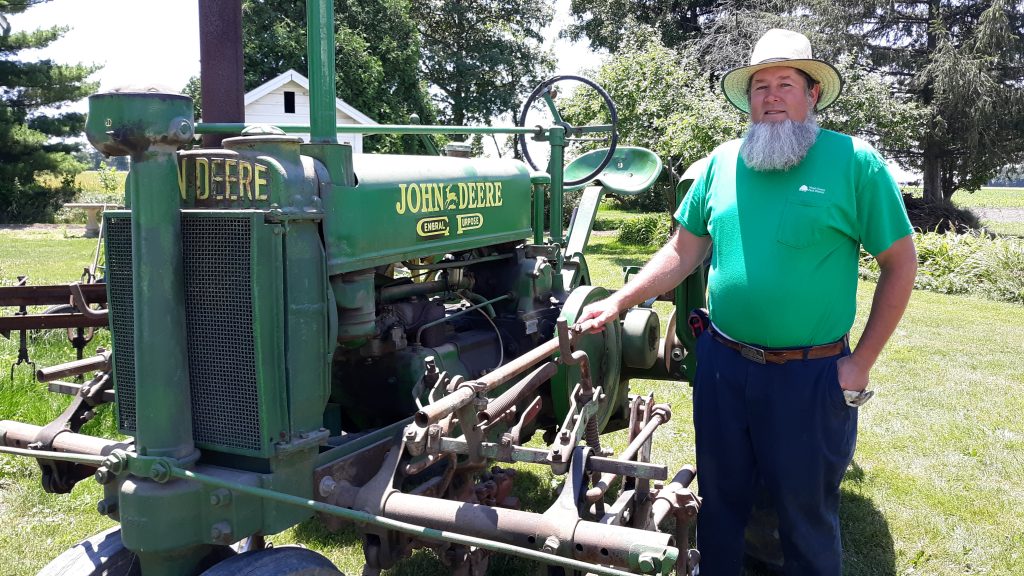
Dauer is meticulous in his restoration of old farming equipment.
He proudly points out the 1939 Farmall tractor with a kerosene manifold, the 1931 Case corn shredder, and the wooden manure spreader that was previously rotting away.
“We brought this back to life. I’m very particular about restoring equipment,” so every detail down to the manure spreader’s McCormick-Deering nameplate was replicated.
Dauer tries to find pieces of old equipment that were once used on Wood County fields. He has collected a wheat thresher from Latcha, a box grain wagon from Pemberville, and a corn shredder from Stony Ridge.
“We’ve tried to acquire as much stuff locally.”
Dauer is still searching for a corn planter with steel wheels.
“Steel wheel stuff is hard to find” – but required to satisfy Dauer’s attention to historic detail.
The old implements were designed so farmers could make repairs themselves – rather than requiring diagnostics equipment.
Dauer recently used a two-row planter on a field – compared to the 16-row planters that many farmers use today. Unlike today’s high-tech farm implements, the pre-1940 equipment is “bare bones” with hard metal seats and no GPS to help plant straight rows.
“I remember when GPS was the tall weed on the ditch bank at the end of the field,” he said.
“People may make fun of this old equipment,” he said, “But this stuff fed the nation, raised people’s families, and paid off farms.”
With Dauer at the farm, field crops are being planted and the gardens are expanding. Last year, the Carter Historic Farm donated 1,300 pounds of produce to the Brown Bag Food Project in Bowling Green.
As it did during the depression era, the Carter Historic Farm is home to livestock as well. There are currently sheep, pigs, goats, chickens – plus barn cats.
“Those are the happiest pigs you’ll see in your life,” he said, watching the swine soak in a mudhole made for their comfort.
In the near future, Gordon hopes to have working horses at the farm, to help in the fields.
“This is a great place to work,” Dauer said. “We’ve really tried to recreate this time period. You can’t pick up a book and see this. This sticks with you.”
“You can sit out in a lawn chair for free, and watch me cultivate all day,” he said with a smile. “There’s a lot to be learned at this place.”
The annual Historic Farmfest at the site on Oct. 2 will show the farm in full use – plus feature items produced from goods grown on site. There will be biscuits made from wheat grown there, cornbread from cornmeal, honey from the bees, maple syrup from the trees, sweet corn and potatoes from the field – and sausage from the swine.

